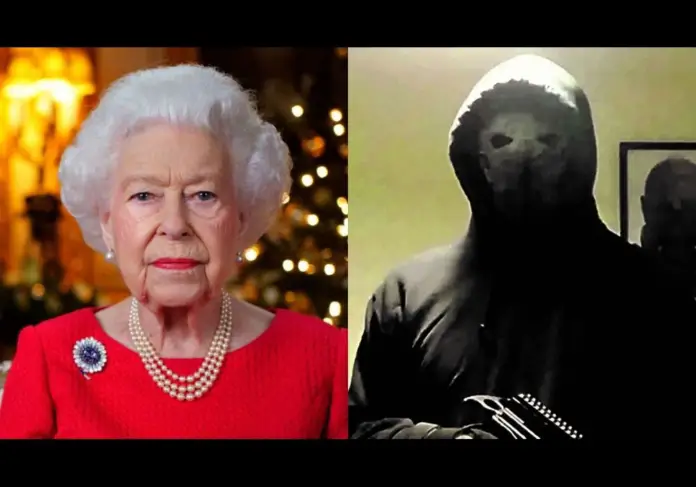Nineteen-year-old British-Sikh Jaswant Singh Chail was detained by Scotland Yard police on Christmas Day morning inside the Windsor Castle, where Queen Elizabeth was reportedly present along with a few other guests preparing to celebrate Christmas. He had just sent a video to his closest friends threatening to assassinate the Queen as retribution for the infamous Jallianwala Bagh Massacre in April 1919, over a century ago where at least a thousand people were massacred in a relentless orgy of shooting carried out by General Dyer.
Chail, who was arrested with a crossbow in hand and in a mask resembling a Star Wars character. He was found saying in the video:
“I’m sorry. I’m sorry for what I’ve done and what I will do. I will attempt to assassinate Elizabeth, Queen of the Royal Family. This is revenge for those who have died in the 1919 Jallianwala Bagh massacre. It is also revenge for those who have been killed, humiliated and discriminated on because of their race. I’m an Indian Sikh, a Sith. My name was Jaswant Singh Chail, my name is Darth Janus [sic].”
As is clear from the above, Chail was referring to the Sith, one of the major antagonists from the Star Wars franchise.
Chail, who apparently grew up in a privileged household, was promptly taken into custody under the British Mental Health Act. It remains to be seen what do the Scotland Yard investigations reveal further about the motivations of the alleged young assassin and how the British criminal justice will deal with this offence.
This incident is being reported by the paranoid British press from a variety of angles, focusing more on the attempted assassination and the weapon and mask found on the would-be assassin than his purported motivation for his alleged action.
From the statement issued by Chail in his video, it seems that the Jallianwala Bagh massacre continues to exercise some traction not only in the Indian subcontinent but in Indian communities who have been well-assimilated – and rewarded – for their loyalty to the British crown over the last many decades. One remembers that this alleged act of terror came just a day before December 16, the 122nd birth anniversary of Sardar Udham Singh Shaheed who was born in a sleepy town of colonial Punjab. A comrade of the much-younger Bhagat Singh, he was a twenty-year old eyewitness and survivor of the horrific Jallianwala Bagh Massacre in Amritsar in April 1919 (101 years old this year). He waited for 21 years to avenge the massacre of the innocents on that fateful day before assassinating the then-Governor of Punjab Michael O’ Dwyer in London on March 13,1940. When he was hanged four months later, he became only the latest in a series of the sons of the soil who gave their lives for the independence of their countrymen, and in doing so became a hero to millions. A tradition which began with Kartar Singh Sarabha and continued with Bhagat Singh.
At his trial, when asked about his motivation, Singh explained:
‘I did it because I had a grudge against him (O’ Dwyer). He deserved it. He was the real culprit. He wanted to crush the spirit of my people, so I have crushed him. For full 21 years, I have been trying to seek vengeance. I am happy that I have done the job. I am not scared of death. I am dying for my country. I have seen my people starving in India under the British rule. I have protested against this, it was my duty. What greater honour could be bestowed on me than death for the sake of my motherland?’
He was later executed in July 1940 in Pentonville Prison.
Interestingly, a biopic was released on Udham Singh earlier this year in October starring Vicky Kaushal as the eponymous character which has been doing well in the cinemas.
The Jallianwala Bagh incident caused immense resentment about the British Raj, since the English General Dyer fired on a peaceful group of people who were unarmed and many of whom were revelers celebrating the spring festival of Baisakhi with their women and children, and though Hindus, Muslims and Sikhs were numbered among the casualties, the majority of the dead were Sikhs. The incident gave a renewed impetus to the resistance against British colonialism in India, and according to many historians, hastened the end of the British Raj in India, ending the moral justification for continued British presence in the subcontinent.
While the incident is over a hundred years old, there has been no official apology from the British Queen or successive British prime ministers, apart from an expression of regret from Prince Charles during a visit to India. The fact that Chail mentioned race is significant given that while there is official silence on British complicity in the Jallianwala Bagh Massacre to date, the mere mention of racism by British-Pakistani cricketer Azeem Rafiq recently in his treatment by top English cricketers while the former was playing at Yorkshire county was enough to turn the world of British cricket upside down.







